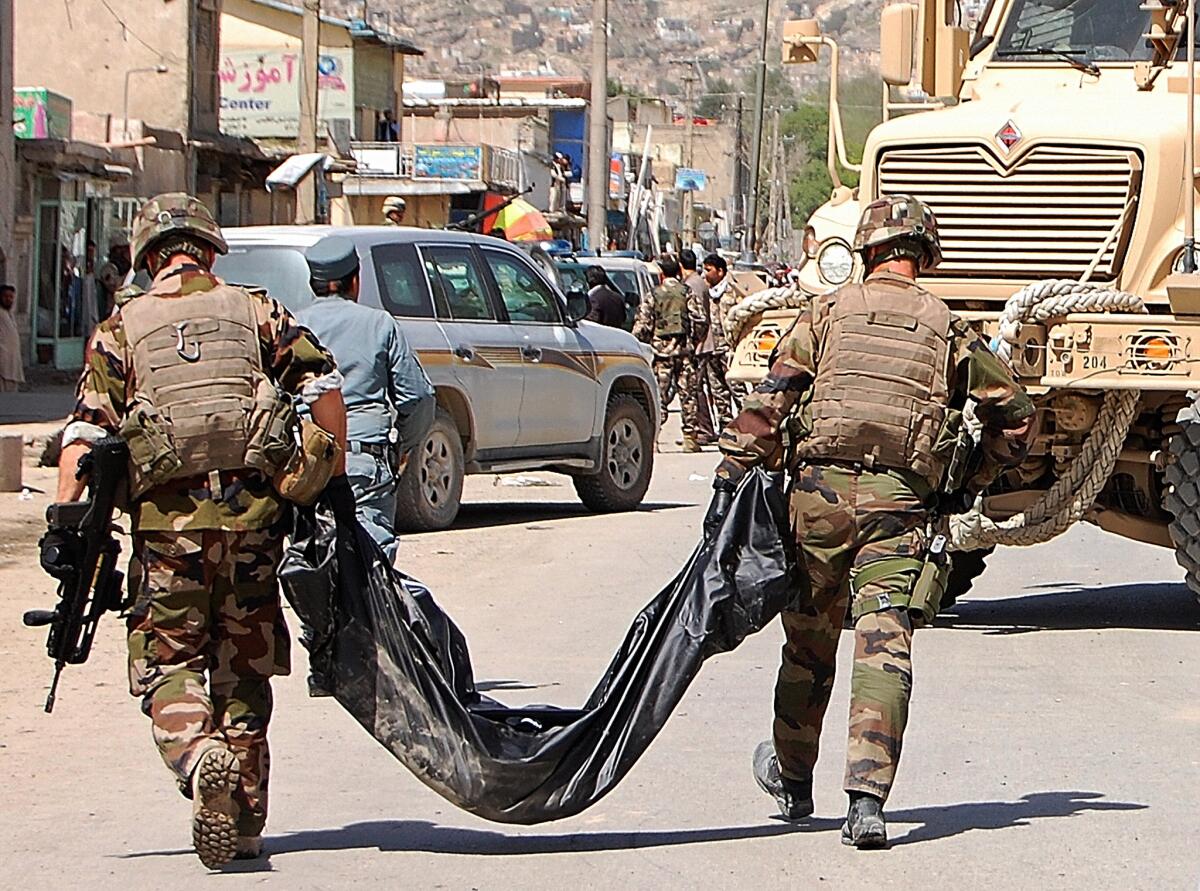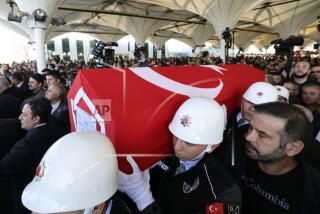Afghanistan suicide attack kills 15, including at least two Americans

KABUL, Afghanistan â The death toll from a powerful suicide car bomb that shook the Afghan capital of Kabul on Thursday morning has increased to 15, including two American troops and four foreign civilian contractors, according to U.S. and Afghan officials.
The attack took place about 8 a.m., said Gen. Mohammad Daud Amin, deputy chief of Kabul police, a time when many people were commuting to work. A suicide bomber in a Toyota Corolla pulled up beside a NATO convoy, Police Chief Mohammad Ayob Salangi said.
Nine civilians were killed and 35 wounded, according to the Afghan Health Ministry. Local authorities said several of the dead were women and children.
Footage of the scene showed the road scattered with debris from torn-apart vehicles in front of several damaged or destroyed houses. Firefighters and police officers were shown combing the wreckage and tending to the injured.
John Manley, a spokesman for the North Atlantic Treaty Organization-led coalition, said the six foreign deaths included two troops and four civilian contractors. He added that it wasnât immediately clear who was targeted in the blast, which remained under investigation.
In a statement, U.S.-military contractor DynCorp International confirmed that the four deceased civilian contractors were its employees and that three others were wounded in the attack. They were in Afghanistan working on a program to help train Afghan security forces.
Pakistan-based Zubair Sediqqi, spokesman for the Hezb-e-Islami Gulbuddin militant group, claimed responsibility for the attack, saying that a suicide car bomb targeted a convoy, killing more than 10 foreigners.
âOur party will increase its attacks against foreign troops in Afghanistan in the future,â he added.
Insurgent groups in Afghanistan have a history of taking questionable credit for attacks done by others and exaggerating claims.
Sediqqi added that the group was also targeting Afghans working with foreigners in Afghanistan. In September, it claimed responsibility for a suicide car bombing that killed 12 people.
Founded in 1977, Hezb-e-Islami Gulbuddin was initially engaged in fighting the countryâs Soviet occupiers. The group was forced out of Kabul by the Taliban in the mid-1990s, then found a new mission after 2001, according to the Columbia World Dictionary of Islamism, when it aligned with remnants of the Taliban and Al Qaeda to fight the government of President Hamid Karzai.
Karzai condemned Thursdayâs attack, calling it âan inhumane and un-Islamic act.â
âTerrorists and enemies of Afghanistanâs peace brutally targeted a residential area and left many innocent civilians including children dead and injured,â he said in a statement.
Marine Gen. Joseph F. Dunford Jr., who commands international troops in Afghanistan, said, âThe insurgents cannot offer the Afghan people a better future.â
âAll they can offer is violence and oppression,â he said in a statement. âWhile todayâs attack shows the insurgents remain dangerous, they are not a threat to the Afghan government and its forces.â
In April, the Taliban said it was stepping up attacks on international troops and diplomatic targets as part of its spring offensive, when insurgent strikes tend to increase as the weather improves.
The last explosion in Kabul took place in March, when Taliban suicide bombers killed nine civilians lining up outside the Afghan Ministry of Defense during the visit of U.S. Defense Secretary Chuck Hagel.
This latest attack comes as Afghan forces take more responsibility for the nationâs security as foreign combat troops prepare to leave Afghanistan by the end of 2014.
ALSO:
Car bombings, shooting in Iraq kill at least 17
Taiwan says Filipino apology in fishermanâs death not enough
Global Voices: Palestinian quest for statehood a moving target
Special correspondent Baktash reported from Kabul. Staff writer Magnier reported from New Delhi.
More to Read
Sign up for Essential California
The most important California stories and recommendations in your inbox every morning.
You may occasionally receive promotional content from the Los Angeles Times.










